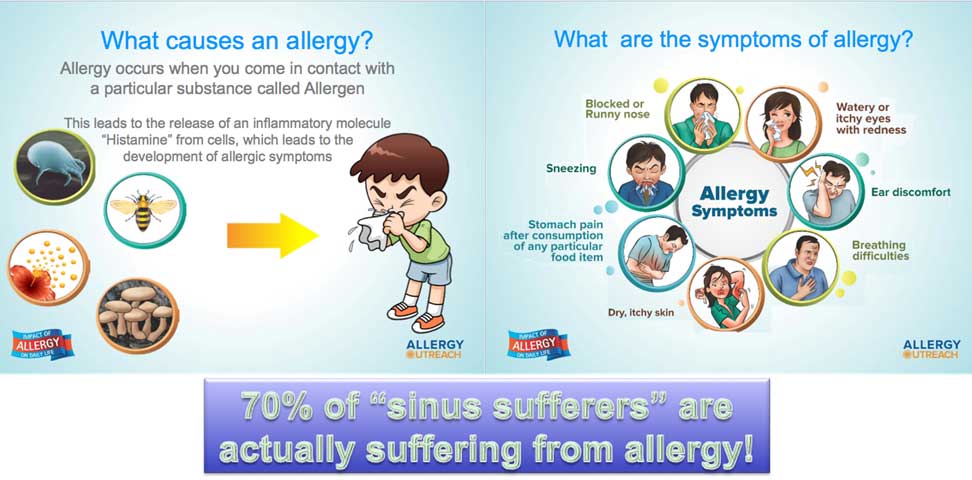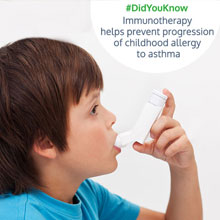ALLERGIES & ASTHMA
WHAT IS AN ALLERGY?
" A condition of unusual sensitivity to a substance or substances which, in like amounts, do not affect others."
Allergy is an excessive reaction of the immune system to substances which are normally harmless.

CAUSES OF NASAL ALLERGIES (ALLERGIC RHINITIS - AR)
An allergy is a sensitivity to a substance called an allergen. Nasal allergies are most commonly caused by one or more of four kinds of allergens: pollen, house-dust mites, mold, and animals. Because pollen is a problem only during certain times of the year, it usually causes seasonal nasal allergies. House-dust mites, mold, and animals may be around all year long, and so usually cause perennial nasal allergies. Other substances, called irritants, can bother the nose and make allergy symptoms worse.
ALLERGIC RHINITIS & ASTHMA
Allergic asthma often shares the same allergic triggers as allergic rhinitis.
It is important to consider allergy and asthma as the manifestations of a hypersensitive "UNITED AIRWAYS".
The same allergens that give some people sneezing fits and watery eyes can cause an asthma attack in others. Allergic asthma is the most common type of asthma. About 90% of kids with childhood asthma have allergies, compared with about 50% of adults with asthma. The symptoms that go along with allergic asthma show up after you breathe things called allergens (or allergy triggers) like pollen, dust mites, or mold. If you have asthma (allergic or non-allergic), it gets worse after you exercise in cold air or after breathing smoke, dust, or fumes. Sometimes even a strong smell can set it off. Because allergens are everywhere, it's important that people with allergic asthma know their triggers and learn how to prevent an attack.
WHAT IS ALLERGIC ASTHMA?
If you have allergic asthma, your airways are extra sensitive to certain allergens. Once they get into your body, your immune system overreacts. The muscles around your airways tighten. The airways become inflamed and over time are flooded with thick mucus.
Whether you have allergic asthma or non-allergic asthma, the symptoms are generally the same. You're likely to:
- Cough
- Sneeze
- Be short of breath
- Breathe quickly
- Feel your chest get tight
COMMON CAUSES FOR ALLERGIC ASTHMA :
Allergens, small enough to be breathed deep into the lungs, include :
- Windblown pollen from trees, grasses, and weeds
- Mold spores and fragments
- Animal dander (from hair, skin, or feathers) and saliva
- Dust mite faeces
- Cockroach faeces
Allergens aren't the only thing that can make your allergic asthma worse. Irritants may still trigger an asthma attack, even though they don't cause an allergic reaction.
These Includes :
- Smoke from tobacco, a fireplace, candles, incense, or fireworks
- Air pollution
- Cold air
- Strong chemical odours or fumes
- Perfumes, air fresheners, or other scented products
- Dusty rooms
Your doctor can test you to see what causes your allergic asthma. The two most common (and recommended) methods are :
- Pricking your skin with a tiny amount of the allergen and measuring the size of the red bumps 20 minutes later
- A blood test known as a specific IgE or sIgE test
The second National Heart, Lung, and Blood Institute (NHLBI) guideline on allergic rhinitis & asthma management recommends that all allergic rhinitis & asthma patients who require daily or weekly therapy be evaluated for allergens as possible contributing factors. They also note that, in selected patients with asthma at any level of severity, specific allergy testing may be indicated as a basis for allergen avoidance or immunotherapy.
TREATMENT
MEDICATIONS:
Nasal allergy medications that don't make you sleepy (like over-the-counter generic Claritin), saline rinses, and decongestant nasal sprays (but only for a few days). If these don't work, use nasal steroid sprays and stronger antihistamines. If none of this helps, it may be time to talk to a doctor about allergy shots. There are many good asthma treatments, but most require a prescription. These medications include inhaled steroids, which fight inflammation, and bronchodilators, which open up your airways. If traditional treatments don't help your allergic asthma, Xolair, an injectable medication that reduces IgE levels, may help.You may be given an asthma inhaler with albuterol, ipratropium, and/or inhaled steroids (anti-inflammatory agents). You should see a gradual improvement in asthma symptoms over six to eight weeks.




